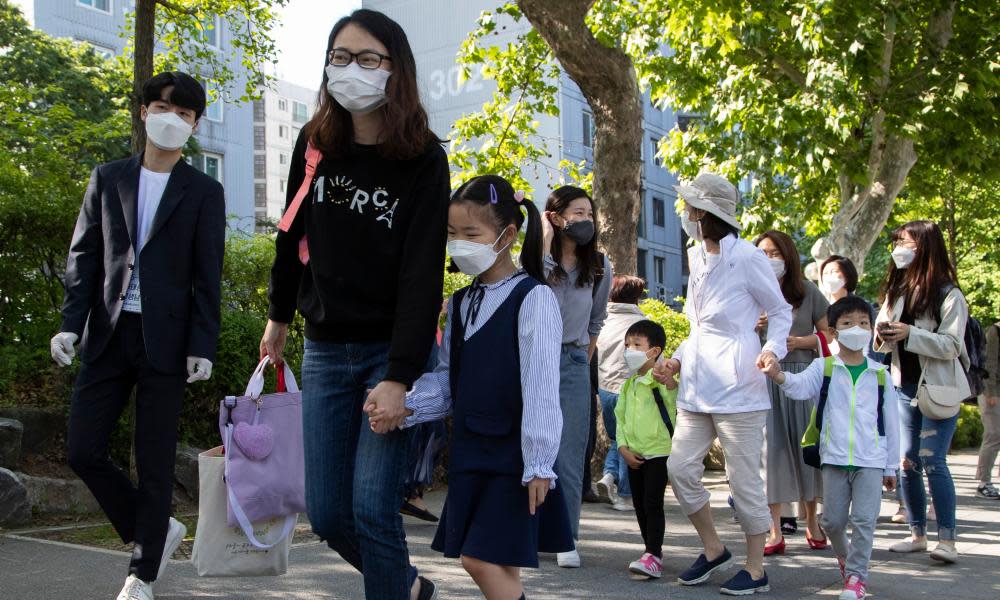Global report: EU countries block hydroxychloroquine, South Korea fears new spike

France, Italy and Belgium have all taken steps against the use of hydroxychloroquine in treating patients with Covid-19 as safety concerns over the drug, touted by Donald Trump and Brazil’s president, Jair Bolsonaro, continue to grow.
Paris on Wednesday revoked a decree allowing doctors to use the drug with severely ill coronavirus patients, while the Italian and Belgian medicine agencies either suspended or warned against its use except in clinical trials.
Days after the World Health Organization suspended a global trial of the drug citing safety concerns, Oxford University also paused an international hydroxychloroquine trial less than a week after it started.
Related: French tests show even mild coronavirus illness leads to antibodies
An observational study published in the Lancet of nearly 100,000 patients in 671 hospitals has suggested hydroxychloroquine – promoted by the controversial French infectious diseases specialist Didier Raoult – might increase mortality rates.
Meanwhile, research by France’s Pasteur Institute suggested 98% of people with mild coronavirus developed antibodies capable of neutralising the virus a month later, raising hopes that everyone who has had the disease may enjoy some immunity.
As the EU unveiled a proposed €750bn (£673bn) recovery plan – the biggest EU stimulus package in history – to get the continent back on its feet after the economic devastation wrought by the pandemic, Latin America overtook Europe and the US in the number of new daily infections.
The European Commission plan was proposed to the European parliament and 26 member states on Wednesday, aimed at helping the worst-affected countries – in particular Italy and Spain – with a mixture of €500bn of grants and €250bn of loans.
Under the commission’s blueprint, Italy would get €82bn in grants, Spain €77bn, France €39bn, Poland €37bn and Germany €29bn.
The EU’s economic affairs commissioner, Paolo Gentiloni, called the package a “European breakthrough” that would “tackle an unprecedented crisis”, but it is far from being a done deal: a so-called frugal four northern members are opposed to shared debt and cash handouts for already debt-laden nations.
Spain on Wednesday began 10 days of official mourning for the more than 27,000 people who have died of Covid-19, as Moscow’s mayor, Sergei Sobyanin, announced an easing of the Russian capital’s lockdown from 1 June.
Infections continued to creep up in and around Seoul, South Korea, prompting Jeong Eun-kyeong, the director of Korea Centers for Disease control and Prevention, to say social distancing measures eased in April may need to be reimposed.
South Korea reported 40 new cases on Wednesday, its biggest daily rise in nearly 50 days, as officials scrambled to trace hundreds of infections linked to nightclubs, restaurants and a massive e-commerce warehouse near Seoul.
“We will do our best to trace contacts and implement preventive measures,” Jeong said, “but there’s a limit to such efforts. There’s a need to maximise social distancing in areas where the virus is circulating, to force people to avoid public facilities and other crowded spaces.”
Countries across the Middle East, meanwhile, are cautiously eyeing a return to normality after the end of the Eid al-Fitr holiday. A four-day lockdown was lifted in Turkey, with shopping malls and hairdressers reopening on Wednesday morning.
In government-held Syria, mosques reopened and inter-city travel was allowed again, while mosques in Saudi Arabia reopen for Friday prayer from this week. Major Shia shrines in Iran were allowed to open over Eid as the number of deaths fell.
There have now been 118,000 confirmed cases of coronavirus across the 54 nations of Africa, according to the WHO’s regional office, with about 3,500 deaths. The UN said the pandemic could cause the number of west Africans living in food insecurity to double to 43 million in the next six months.
The virus continued its onward march in Latin America, where Brazil reported the highest daily death toll in the world for the fifth straight day, pushing its total to 24,512 with infections soaring to more than 390,000.
Related: Coronavirus live news: European commission proposes €750bn Covid-19 recovery plan
“We are particularly concerned that the number of new cases last week in Brazil was the highest for a seven-day period since the outbreak began,” the Pan American Health Organization said. “Both Peru and Chile are also reporting a high incidence, a sign that transmission is still accelerating.”
As laboratories race to develop a vaccine, new polling in the US suggested only half Americans might actually take it. An Associated Press-NORC Center for Public Affairs Research poll released on Wednesday found 31% were not sure if they would get vaccinated, while one in five said they would refuse, mostly on safety grounds.
In other developments:
Bulgaria will allow restaurants, bars and cafes to reopen at full capacity on Monday, further easing restrictions imposed in mid-March.
Officials in Strasbourg, France have appealed for hundreds of spectators who attended an illegal football match at the weekend to be tested for Covid-19.
People in Poland will be allowed to go outside without masks from 30 May as long as they can keep two metres apart. Masks are still mandatory on public transport and in shops.
Switzerland announced on Wednesday it would remove most of its remaining restrictions on 6 June, when all leisure and entertainment activities will resume if appropriate precautions are in place.

 Yahoo News
Yahoo News 
